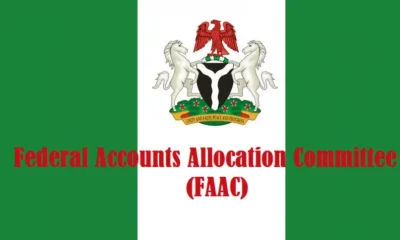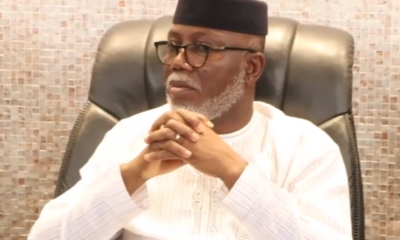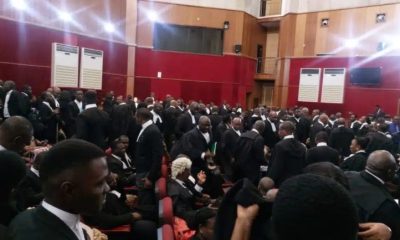News
LGs’ Administration: Lawyers Oppose Govs’ Appointment Of Caretaker Chairmen
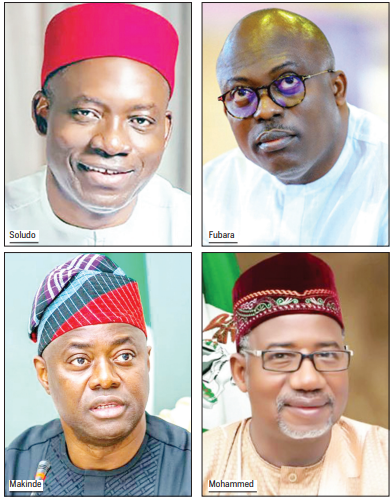
AKEEM NAFIU writes that lawyers have called for an immediate end to the era of state governors’ illegal and unconstitutional appointment of caretaker chairmen to run the affairs of local governments across the country
Some senior lawyers have frowned at state governors’ continuous breach of Section 7 of the Constitution which stipulates that a system of democratically elected local government councils must be in place at every given time across the country.
The lawyers spoke at the weekend amid the controversy generated by the appointment of Caretaker Committee Chairmen to man the 23 Local Government Areas of Rivers State by Governor Sim Fubara.
The governor’s action was aimed at dislodging the democratically elected chairman of the the local councils whose tenure were said to have expired.
It would be recalled that the governor had nominated the Caretaker Committee Chairmen for the twenty-three (23) local government areas of the state when he sent their names to the Rivers State House of Assembly led by Speaker, Victor Jumbo.
The ensuing crisis that erupted following the swearing-in of the Caretaker Chairmen by Governor Fubara led to the death of a policeman at the Eberi-Omuma Secretariat in Omuma Local Government Area of Rivers State.
LGs’ Administration in Anambra
In Anambra State, the incumbent Governor, Prof. Charles Soludo, has continued in the path of his predecessor, Willie Obiano, who ran the third arm of government with caretaker chairmen for 8 years. Soludo has been running the affairs of the state’s 21 local government areas with administrators since his assumption of office two years ago.
This is in contrast to his campaign promise in 2021 that his priorities would be to conduct local government election as soon as he becomes the governor. Governor Soludo has within two years renewed the appointment of the same set of caretaker chairmen seven times, until when he announced their removal a couple of weeks ago.
The State House of Assembly has already confirmed the new list of 21 caretaker chairmen and councillors sent to it by the governor. House Speaker, Somtochukwu Udeze, said the appointment was confirmed in line with Section 208 of the Local Government Law, 1999 as amended.
The local government transition committee chairmen were expected to serve for a period of three months at the first instance. Condemning the governor’s action, a member of the House of Representatives, Afam Ogene, queried the rationale behind the appointment of caretaker chairmen to manage the affairs of local governments.
Ogene, who is a member of the Labour Party representing Ogbaru Federal Constituency in Anambra State, asked citizens to reject every
Section 7 of the Constitution mandates a system of democratically elected local government council
move by the government to shrink development at the third tier of government. The lawmaker noted that the latest appointments make it the eighth times that the governor would appoint caretaker chairmen to run the affairs of the local governments. “This is an inglorious record by a democratically elected governor.
This puppeteering style of leadership, which toys with the destiny, aspiration and desires of the grassroots, must be resisted and not allowed to continue to shrink the development potential of the LGAs.
“The local government ought to be the most important tier of government, as envisaged by the Nigerian Constitution, because it’s not only the tier that is closest to the people, it is also the obvious foundation of both the subnational and the federal government.
And should not be at the whims of state governors. “Such undemocratic practice of appointing LGA administrators, rather than democratic election, is an enabler of impunity and lack of democratic accountability and also hurts transparency in the local governments and the state as a whole, as those so appointed would only scramble for personal interests during the three months of their stay in office.
This does not help the management of scarce resources or the development of the LGAs”, the lawmaker said.
Bauchi gov’s confession
Governor Bala Mohammed of Bauchi State had in 2020 declared that the appointment of caretaker chairmen to manage the affairs at local governments by state governors is unconstitutional and undemocratic.
The governor while speaking during the swearing-in ceremony of four council caretaker chairmen in Bauchi said he had to made the appointments in order to fill the existing vacancies in the affected LGs. “I did not want to come out for this swearing-in because I knew I had promised Nigerians that we were going to hold local government elections very soon.
But this situation is a doctrine of necessity that we had to swear in and get extension of the tenure of local government caretaker chairmen from the state Assembly in view of the COVID-19 pandemic which has precluded us from abiding by the time-table set out by the State Independent Electoral Commission.
“I want to reiterate that we will hold council elections as soon as it is feasible. We have completed all arrangements to do that. That is the only way we can show and deepen democracy in Nigeria and we know that this caretaker system is not democratic, it is unconstitutional but we have to fill in the vacuum”, the governor said.
Senate’s intervention
Dissatisfied with the unending cases of state governors penchant for appointing caretaker chairmen to run the affairs of local governments, the Senate had in 2023 asked the Federal Government to stop the statutory allocation of funds to councils whose chairpersons were not democratically elected.
The red chamber adopted the resolution following a motion by the Senate Minority Leader, Abba Moro (PDP, Benue South) during the plenary.
Moving the motion, Senator Moro expressed deep concerns about the illegal actions of some state governors who are removing elected local government officials and replacing them with caretaker committees, saying the development negates the constitutional provision of the local government system.
He consequently urged his colleagues to condemn the use of caretaker chairpersons as administrators of local governments. In his contribution, Senator Adams Oshiomhole (APC, Edo North) declared that state governors lack the powers to replace elected local government chairmen with administrators.
Also speaking in support of the motion, Senate’s Chief Whip, Ali Ndume (APC, Borno South) sought for an end to the caretaker committee’s arrangement at local governments across the country.
He pointedly asked the Federal Government to stop the release of funds to local government areas run by caretaker committees. Majority of the senators supported the motion when it was put to debate.
Court’s verdict banning caretaker committees’ arrangement
State governors are currently under obligation to ensure that the various local government areas in their domains are manned by elected officials. This was sequel to a Supreme Court judgement which bars the state executive from doing anything to the contrary.
In the judgement delivered on December 9, 2016, the apex court voided laws enacted by states’ Houses of Assembly which empowered governors to sack elected local government chairmen and councillors and replace them with handpicked administrators. The judgement was in relation to an appeal over the dissolution of the 16 local government executives in Ekiti State by Dr. Kayode Fayemi during his first term as governor.
In the unanimous judgement delivered by a 5-man panel of Justices led by Olabode Rhodes-Vivour, the Supreme Court described the sacking of elected local government administrators by state governors as “executive recklessness” that should stop immediately.
In faulting the law purportedly relied on by Fayemi to dissolve the local government administration, the apex court held that Section 23(b) of the Ekiti State Local Government Administration (Amendment) Law, 2001, which empowered the governor to dissolve local government councils, whose tenure was yet to expire, violated Section 7(1) of the Constitution from which the state House of Assembly derived the power to enact the local government law.
According to Justice Centus Nweze, who delivered the lead judgement, the tenure of elected officials at the local government councils could not be abridged without violating the supreme constitutional provisions.
Oyo gov’s sacking of elected
LG officials Despite the Supreme Court’s verdict, all elected local governments chairmen across Oyo State were removed in 2019 by Governor Seyi Makinde upon his assumption of office. The governor’s action was greeted with lots of public condemnation.
The Federal Government also intervened through the then AGF, Abubakar Malami (SAN), who wrote the governor on the need to rescind his decision. In a letter dated January 14, 2020, Malami told the governor that in view of the decision of the Supreme Court on the matter that is binding on all the 36 states of the federation, “the common practice by some state governors in dissolving elected local government councils is unconstitutional, null and void”.
The matter later became a subject of litigation between the sacked LG officials and Governor Makinde. The sacked local government chairmen, led by Ayodeji Abass-Aleshinloye, approached the Oyo State High Court seeking for a declaration of their removal from office as illegal. The case later proceeded to the Court of Appeal where the governor won.
Dissatisfied, the sacked chairmen headed to the Supreme Court. In a judgement delivered on May 7, 2021, the Supreme Court voided the removal of the local governments elected officials by Governor Makinde.
In a unanimous judgement delivered by Justice Adamu Jauro, the apex court ruled that the dissolution of local governments in Oyo state and their replacement with caretaker committees by Governor Makinde is illegal.
In the judgement, Justice Jauro ordered that all entitlements owed to the sacked chairpersons from the date of their unlawful sack to the date they were to vacate office, should be paid to them.
The judge also awarded a cost of N20 million in favour of the sacked chairmen and asked the Attorney General of Oyo State to file an affidavit of compliance latest August 7, 2021.
Lawyers speak
In the meantime, some senior lawyers have voiced their opposition to the unabated imposition of caretaker committee chairmen on local governments by state governors.
Speaking on the development, a Senior Advocate of Nigeria (SAN), Mba Ukweni, declared that any system of local government that is not manned by elected representatives of the people cannot be in consonance with the Constitution. “But again, the law dislikes vacuum.
The tenure of the outgone local government chairmen has expired. It would also be unconstitutional to elongate their tenure because they are not supposed to stay longer than their tenure. “Because the law dislikes vacuum, there must be somebody in that office. I was expecting that the head of local government administration should have taken over immediately.
But for the governor to have appointed a caretaker committee is rather unconstitutional. I don’t see any law that will be at variance
Caretaker committee chairmen presiding over the affairs of local governments is an illegality
with the Constitution which stipulates that what should be at the local governments is a system that is democratic in nature. “The caretaker committee is not a democratically elected local government system. But in an emergency, the governor has the responsibility to put people in place to be able to run the affairs of the local government.
“He cannot allow the local government system to go into anarchy and the caretaker committee chairmen should only be allowed to run the affairs of their respective local governments within a stipulated time frame to be able to pave the way for elections in the local governments,” Ukweni stated.
Another member of the Inner Bar, Olalekan Ojo, noted that there is no ambiguity under the law as to the illegality of caretaker committee chairmen presiding over the affairs of local governments across the country. The SAN posited: “Although there are some states, there are some local government laws which enable the governors to set up caretaker committees.
“But by the mandatory provision of Section 7 of the 1999 constitution, as amended, there must be in place a system of a democratically elected local government councils in Nigeria. “There are many authorities to the effect that the appointment of caretaker committees is against the constitution”.
Speaking while reacting to the attitude of state governors appointing caretaker committee chairmen to run the affairs of the various local governments across the country, a Senior Advocate of Nigeria, SAN, Chief Solo Akuma, posited that the development is a residual matter because Section 7 of the 1999 constitution (as amended) said the law governing local governments shall be made by the State Houses of Assembly.
According to the SAN, “So, where the State Houses of Assembly makes a law for a caretaker committee, what would the governors do? “The law governing the formation, finance, and everything about local governments is to be made by the State Houses of Assembly. So, if the State Houses of Assembly make a law creating provisions for caretaker committees alongside their term and duration, and the governors implement them, have they done anything wrong?
“It is only when there is no law creating local governments that the governors would be bound to conduct elections. That is why the governors are doing what they are doing. “Let nobody be deceived, the governors control local governments through the Houses of Assembly by the law made by the legislative bodies.
For you to condemn a governor, you must look at the law made by the State House of Assembly whether there is a provision for a caretaker committee. If there is the provision for a caretaker committee, and he obeys it, you cannot condemn such a governor”.
For Dr Abiodun Layonu (SAN), governors constituting caretaker committees to run the affairs of local governments is clearly against the spirit of the Constitution. Layonu said: “Everybody knows it is unconstitutional. The constitution discourages the appointment of caretaker committee chairmen by state governors clearly by the provision of Section 7 of the 1999 constitution (as amended).
“It could be that it serves as a political interest of the governors who are doing it in terms of control of the finances and operations of the local governments. “Unless mechanisms are put in place either by way of constitutional amendment or some other methods to discourage this undemocratic practice, the development is bound to continue.
“It could be that if you do not follow what the constitution says, there should be some penalties that would accrue, and so long as local governments remain a part of revenue sharing formula, it is unlikely that governors would want to let go in terms of control”.
Speaking in the same vein, a rights activist, Timothy Adewale, noted that even the Supreme Court frowns at anything called caretaker committees at the various local government areas. Referring to the provision of the Constitution Adewale said: “The constitution says a local government system in Nigeria is guaranteed and the mode of appointment of who to be the head is equally guaranteed in the constitution.
“As far as the Supreme Court is concerned, if the constitution says that the local government shall be guaranteed in Nigeria, you then can’t do anything contrary to that. “The Chief Executive of a local government should be by an election as provided for in the constitution. Anything short of that is nothing but unconstitutional”.
Source: New Telegraph
-
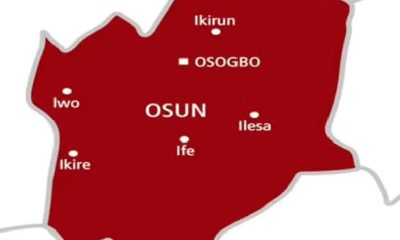
 Opinion5 days ago
Opinion5 days agoThe Clout-chasing Dipo Awojide By Comrade Da’Peace
-

 News4 days ago
News4 days agoRamadan, Lent: Shettima Calls For National Unity And Compassion
-

 Opinion4 days ago
Opinion4 days agoReinventing Osun’s Economy Through Dagbolu Intl. Trade Centre: From Quiet Market Lessons To Regional Trade Revolution By Adeboye Adebayo
-

 News4 days ago
News4 days ago‘Wike Factor’: Another PDP Chairmanship Candidate Steps Down For APC In FCT



